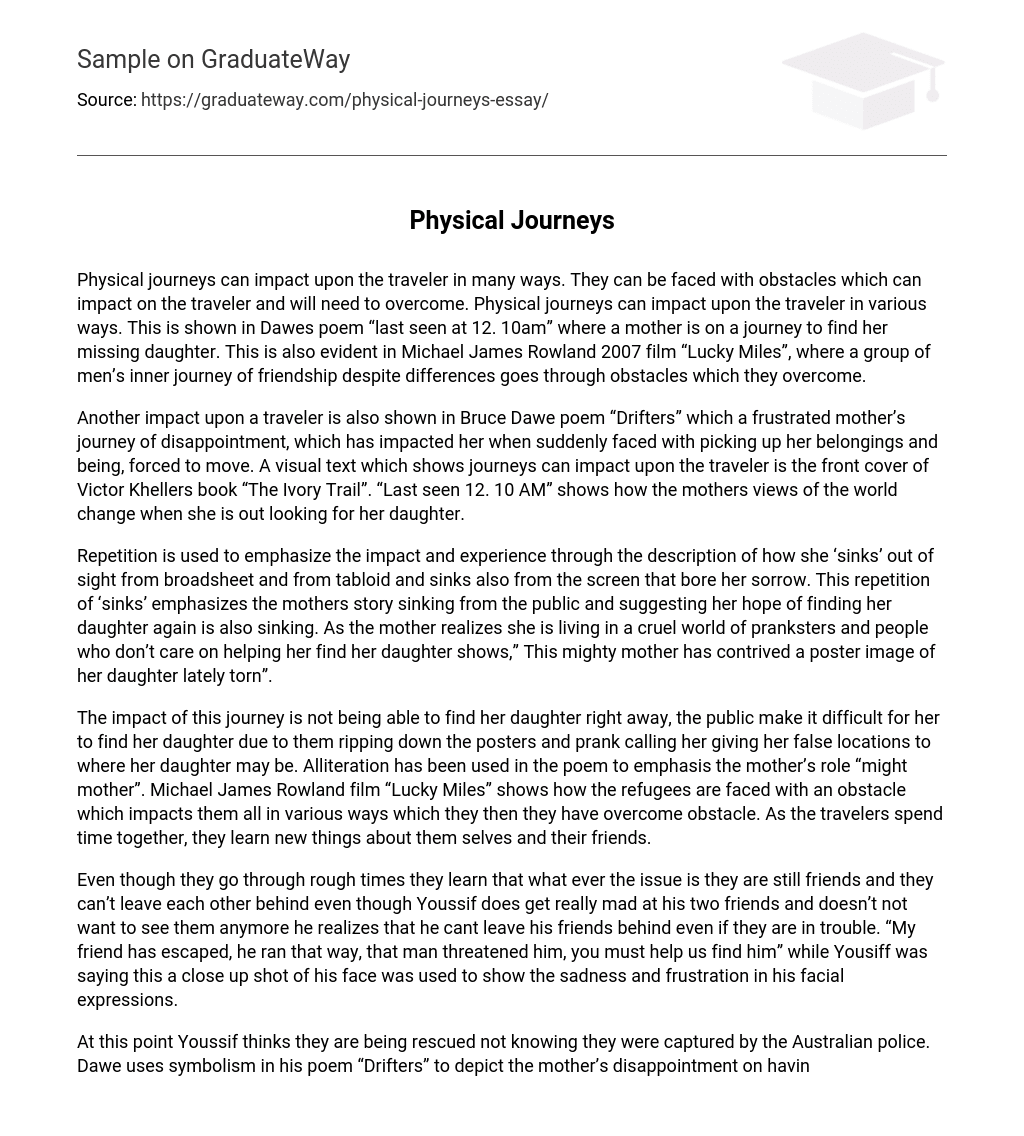Physical journeys have the potential to affect travelers in numerous ways. These journeys often present obstacles that challenge travelers and force them to find ways to overcome them. The impact of physical journeys on individuals is demonstrated in Dawes poem, “last seen at 12. 10am,” which recounts a mother’s quest to locate her missing daughter. Similarly, Michael James Rowland’s 2007 film, “Lucky Miles,” portrays a group of men who embark on an inner journey of friendship amidst their differences and encounter various obstacles that they successfully navigate.
Another impact on a traveler is evident in Bruce Dawe’s poem “Drifters”, where a frustrated mother experiences a disappointing journey and is suddenly forced to move. This journey profoundly affects her. Similarly, Victor Kheller’s book “The Ivory Trail” conveys how journeys can impact travelers through its front cover, specifically the line “Last seen 12. 10 AM”. This line signifies the mother’s shifting perspectives as she searches for her missing daughter.
The use of repetition highlights the significance and intensity of the experience by illustrating how she ‘sinks’ out of sight in both broadsheet and tabloid publications. The repetition further emphasizes the mother’s story fading away from the public eye, while also suggesting her diminishing hope of being reunited with her daughter. The mother becomes aware that she lives in a harsh world filled with pranksters and uncaring individuals who offer no assistance in locating her child. As a result, the mother has created a powerful image of her recently torn daughter on a poster to raise awareness.
The mother on this journey experiences the difficulty of not being able to immediately find her daughter, as the public hinders her search by tearing down the posters and prank calling with misleading information. The poem employs alliteration to underscore the mother’s crucial role as a “mighty mother.” In Michael James Rowland’s film “Lucky Miles,” the refugees encounter a common obstacle that affects them individually, yet collectively they manage to overcome it. Through their shared time together, the travelers uncover new aspects of themselves and their companions.
Despite facing difficulties, they realize that no matter the problem, they remain friends and cannot abandon one another. Even though Youssif becomes extremely angry at his two friends and initially doesn’t want to see them anymore, he eventually understands that he cannot leave his friends behind, even in difficult situations. “My friend has escaped, he ran that way, that man threatened him, you must help us find him.” As Yousiff was saying this, a close-up shot of his face was used to capture the sadness and frustration evident in his facial expressions.
At this point, Youssif is under the impression that they are being rescued, unaware that they have actually been captured by the Australian police. In his poem “Drifters,” Dawe uses symbolism to convey the mother’s disappointment in constantly having to move houses. This disappointment has greatly affected the mother, as seen in the image of “green/tomatoes from the vines,” which symbolizes the frustration of unfulfilled hope, in contrast to the ripe berries upon arrival. This effectively helps the reader comprehend the mother’s mental anguish caused by constantly drifting from one house to another. The phrase “Not all journeys have an ending” suggests that the journey is ongoing and unpredictable, leaving the viewer uncertain and intrigued about what will unfold in the story. This quote relates back to the image of a man in the bottom left hand corner, whose eyes convey a sense of longing and searching for answers. The impact of this is that it can affect the traveler in various ways, as they may not be able to find the answers they seek.
Symbolism is creatively employed by Victor Kelleher in this image. The ripples in the sand symbolize the numerous paths the traveler can choose on their journey, signifying that these paths have no definite end. Additionally, the ripples may also represent the challenges encountered by the traveler and how they have grown from overcoming these obstacles. In summary, “Drifters,” “Lucky Miles,” “Last seen at 12.10AM,” and “The Ivory Trail” all have distinct impacts on each individual traveler.





